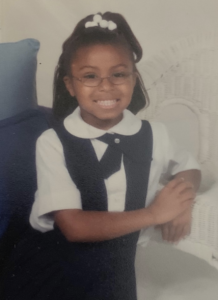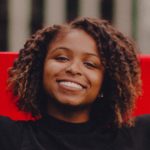The Coincidence That Changed My Life
In our call for educational equity, we continue to see individuals being used as success stories and their individual success amplified. But what got them to that point? It’s about time we identified, measured, and scaled what’s working to support student success.
In the New York Times best seller The Other Wes Moore, Robin Hood Foundation CEO Wes Moore details his story of growing up in a low-income Baltimore neighborhood, one block away from another young boy. Both of them shared practically everything in common—including the name Wes Moore. The book breaks down their identical upbringings, similar familial structures, and the life-changing events eventually leading up to their fates. By the end of the book, we learn that our Wes Moore, the person whose words we were reading, goes on to graduate from college, become a Rhodes scholar, serve in the military, and live a choice-filled, comfortable, and “successful” life. The other Wes Moore, on the other hand, is convicted of murder and will spend his entire life in prison.
Moore does an incredible job of making us understand, and empathize with, both of their stories. Given that the boys had identical upbringings, it was impossible not to believe that, along the way, many systems, including the educational system, failed the other Wes Moore. We want both boys to succeed; but we must face that our Wes Moore had something the other didn’t: opportunity and access. While our Wes Moore began to experience job training and personal development, the other Wes was fighting for his life. In the end, our Wes Moore becomes a Rhodes scholar, White House fellow, veteran, and, now, a CEO. And he got there because alongside his hard work, he was surrounded by people and systems ready to invest in his success, which for under-resourced families often arises through luck and happenstance.
Unfortunately, this story is all too common. In many ways, it’s my story, too.
A Chance Encounter
My name is Roquel Crutcher. I grew up in a small southeast Memphis neighborhood called Oakhaven. About 38 percent of Oakhaven residents never finish high school, and only about 8 percent of residents have a bachelor’s degree. Across town, things look very different. In Memphis’s wealthiest neighborhood, Germantown, which is only eleven miles away, only 1 percent of residents don’t graduate from high school, and over 70 percent of residents—nine times as many as the residents of Oakhaven—have a bachelor’s degree or higher.

As a child, I was unaware of these disparities. I was unaware of the immense impact years of oppression had on my entire community. But I was lucky.
At age 9, I was a good fourth grade student at our neighborhood elementary school. I was often on the honor roll and a participant in many extracurricular activities when my family began to discuss the possibility of my attending another school. My neighborhood school was convenient, a family tradition—but it was failing. My family wanted a change. Soon after, my sister coincidentally ran into the founding principal at a new school at the grocery store. The principal was looking to recruit new students, and after talking with my sister, thought I’d be a good fit. From there, my family suddenly had choices, possibilities—and crucial ones at that. I didn’t know it as a 9-year-old, but my life was changed forever. And all because of my big sister’s run-in at the grocery store—because, in other words, of a coincidence.
Leaving our neighborhood school would mean great sacrifice on everyone’s part. It was a family affair. My grandmother sacrificed hours of her day to both drop me off and pick me up in a different neighborhood. My sister became a confidant and more intensely invested in my academic success. My mom had to work longer hours to accommodate extra needs, but would never miss a beat. So many other family members helped my mom with one-off asks. And my life became entirely different. I was in school each weekday for about ten hours, had two hours of homework every night, attended classes on Saturdays, and had almost no summer break.
I didn’t know it as a 9-year-old, but my life was changed forever. And all because of my big sister’s run-in at the grocery store—because, in other words, of a coincidence.
From my new school, I learned just how far families will go to ensure their child receives an excellent education, and I received just that along with a renewed sense of self. I knew I liked school, but I did not understand just how much school would become a second home with a second family, one that wanted us to succeed just as much as our actual family. The students, all from a variety of Memphis neighborhoods, had different ways of learning, but despite that, we were constantly told that we were able to learn and we would be destined for greatness. These lessons and pushes have stuck with me throughout my entire life.
Someone to Guide Me
I couldn’t have known it, but one of the most impactful aspects of my new school was being assigned an advisor. This advisor would follow me—and many other students like me—through high school, college, and beyond. For me, thinking about the distant future was difficult when I wanted to worry only about the present, like most young people. Despite this, the idea of college and a choice-filled life were engraved in my development, and with the help of that assigned advisor, I had every encouragement to push toward college and achieve success.
I came to deeply want that success; but knowing that it was what I wanted wasn’t enough. My school helped me navigate all the other challenges I didn’t even know were coming—the Common App, the FAFSA, financial aid appeals, and countless other jargon-heavy higher education processes that I did not understand. According to Education Northwest, students and families being put off by the complexity of the FAFSA is the fourth largest barrier to FAFSA completion, thus leading to either high loan rates, high dropout rates, or not enrolling at all. I was able to bypass hurdles like these because my school proactively provided support. Once I was admitted into college and my financials were aligned, I received support through college both mentally and academically by my advisor. Everything from my first ever work-study job application to time managing my final thesis paper for my honors program was done with the assistance of a person who had done it before, and who stuck with me while I figured it out. This proved to me far more than that, with the right tools, I could achieve what I wanted: it also taught me that once a school is committed to its students, it is possible for this system—the education system—to have a positive, and long-term, impact.
Ending “Exceptions”
Today, I come home to a community with many peers who live in a very different statistical reality than mine, in part because they were forced into a school system not equipped to provide what all children need. I am a part of the 8 percent of folks from Oakhaven with a bachelor’s degree, and I plan to join the 5 percent with master’s degrees. However, as I plan, I can’t help but wonder about the other percentage of Oakhaven that’s been left behind. They are equally, if not more, “smart.” They are equally, if not more, ready to invest in their own success. The difference between me and them was strictly our access to opportunity—a matter of coincidence.
I will forever be grateful for great schools and my advisor’s interest in and support of me. I was a success story. I am an exception to lots of statistics. However, if we are subjecting so many of our kids to failing schools in under-resourced neighborhoods, who’s looking out for them—for all of them?
When I look back at my life, I can’t talk about accomplishments without talking about people and their substantial impact on my success. My school leaders, my teachers, and my advisor changed my life. Whether through positive reinforcement, flexibility to support different learning styles, or consistent dedication to ensuring I received an excellent education, it worked. It’s about time we did some serious analysis of the impact great schools and their programs have on students, and then to use those lessons at an even broader level: to begin innovating and scaling.
It’s about time we did some serious analysis of the impact great schools and their programs have on students, and then to use those lessons at an even broader level: to begin innovating and scaling.
Instead of creating a world where there are exceptions, due to coincidence and random acts of kindness, it’s time to make sure we have a Memphis flooded with amazing schools and a Baltimore where every Wes Moore achieves greatness. I’m forever grateful to my sister for the coincidence that changed my life; but what if equity wasn’t a matter of happenstance?
For the next two years, I hope to work with the individuals, organizations, and communities most impacted by the absence of these important choices, and with them make educational equity a reality.
In memory of Alexcia Gest, KIPP Through College advisor, mentor, friend.

